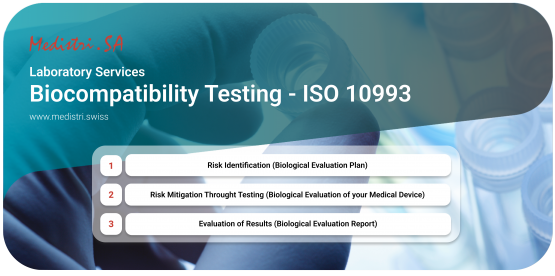👉 What is Biocompatibility?
Biocompatibility is defined as “The ability of a device material to perform with an appropriate host response in a specific situation”. This implies that the materials that make up a medical device that is meant for interaction with or in the human body (or their degradants, leachables, or residuals) should not harm a patient's health. This can include delivery methods and items with many functions.
👉Why perform Biocompatibility Testing?
Manufacturers of Medical Devices must ensure that their products are safe and that any risks are addressed. These risks include the biological threats, such as those posed by:
- Implants that cause a rejection
- Materials that trigger a reaction
- Materials that are broken down or transformed by the body contrary to the intention of the manufacturer
- Chemicals that are leached from the materials in the medical device and absorbed by the body
- Implants and materials that do not grow into the body as desired
The ISO 10993-18 standard tests must be performed when developing a new medical device, when changing the manufacturing process or when changing materials and/or suppliers. (Even if a material has been historically shown to be biocompatible, it must still pass the ISO 10993-18 tests.)
👉 How is Biocompatibility Testing Structured?
Biocompatibility Testing can be divided into the following three steps:
1) Risk Identification (Biological Evaluation Plan)
2) Risk Mitigation through testing (Biological evaluation of your medical device)
3) Evaluation of results (Biological Evaluation Report)
👉 What is the Biological Evaluation Plan?
ISO 10993 states that “The biological evaluation shall be planned, carried out, and documented by knowledgeable and experienced professionals.”
Our laboratory takes into consideration the materials, processing, and historical use of the device. This allows to perform a comprehensive assessment of biological responses for each medical device in relation to its safety.
Our team will help you thoroughly assess the following key data-points:
- What are the clinical use of the product?
- What are the types of dermal contact? ( tract, muscle invasive, bone, bloodstream … )
- Is degradation expected?
- What is the dermal contact time?
- What are the compositions of the materials forming the medical device?
- Can we define representative portions of the medical device that are in contact with the patient or with the liquid that’s in contact with the patient?
- Is there any historical data on the biocompatibility / materials / according to their categorisation ?
👉 What is the Biological Evaluation of a Medical device?
The biocompatibility tests reflect up to 8 different biological effects (themselves divided into different targeted tests). The type of test to be performed among the eight categories is closely related to the use of the medical device .
The choice between different tests, and critical aspects in duration (eg tests implantation) should be discussed with the competent authorities (Swissmedic , FDA…)
- Cytotoxicity
- Sensitisation
- Irritation or intradermal reaction
- Acute Systemic Toxicity
- Subacute Systemic Toxicity
- Genotoxicity
- Haemocompatibility
👉 What is the Biological Evaluation Report?
ISO 10993-1:2018, clause 7 states that “Expert assessors who have the necessary knowledge and experience shall determine and document:
- Strategy and planned content for the biological evaluation of the medical device;
- Criteria for determining the acceptability of the material for the intended purpose, in line with the risk management plan;
- Adequacy of the material characterization;
- Rationale for selection and/or waiving of tests;
- Interpretation of existing data and results of testing;
- Need for any additional data to complete the biological evaluation;
- Biological safety conclusions for the medical device.”
The Biological Evaluation Report (BER) is designed to meet the requirements stated above in ISO 10993-1:2018
🎯 To learn more about our Biocompatibility Testing services according to ISO 10993, visit on our website at www.medistri.swiss or directly contact our team at [email protected].
- The Medistri Team
#Medistri
